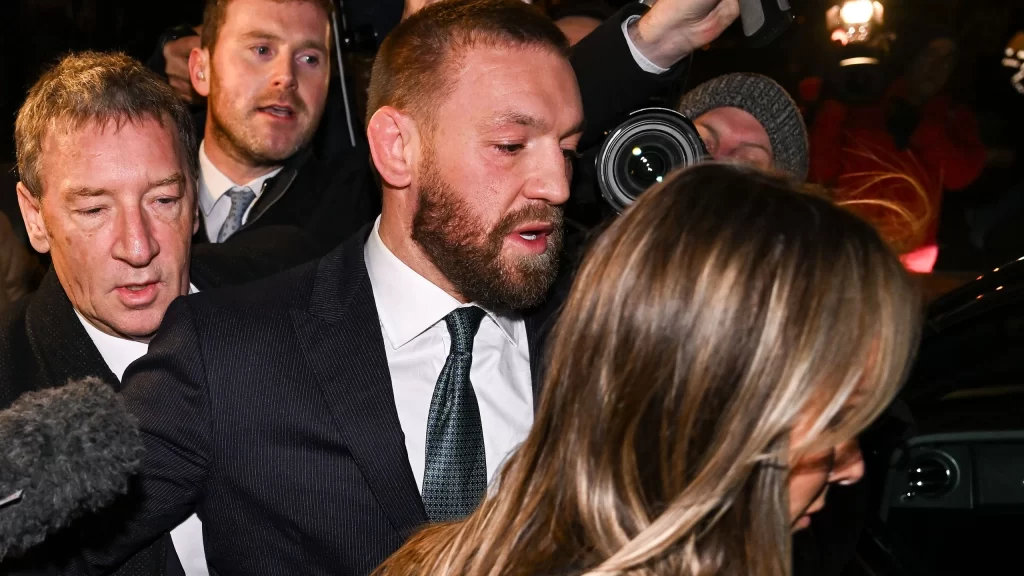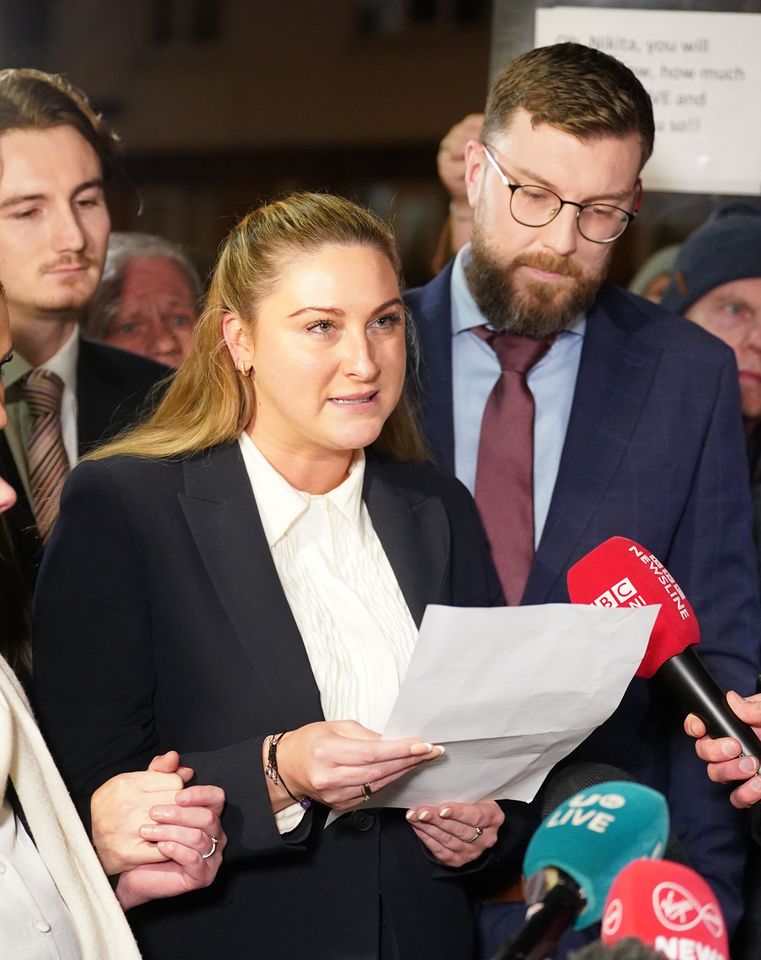Women on Trial: How Nikita Hand’s Case Highlights the Treatment of Rape Survivors
The civil rape case brought against Conor McGregor has captured national and international attention, drawing intense scrutiny to the treatment of victims in sexual assault trials. The case, which concluded with a jury finding McGregor guilty of rape and awarding the plaintiff, Nikita Hand, €248,603 in damages, has sparked widespread debate about justice, victim treatment, and the limits of the legal system.
Throughout the trial, the courtroom was described as tense, and women across the country reportedly waited anxiously for the verdict. The palpable sense of anticipation highlighted societal awareness of how rape victims are treated in the judicial process. Victims are often placed on trial themselves, with their credibility and character questioned at every turn.
This tension was not without merit. The case against McGregor was fraught with deeply personal, traumatic details about the victim’s experience, injuries, and subsequent intimidation. For many observers, the trial stressed the courage it took for Nikita Hand to come forward, knowing she would lose her anonymity and face intense media scrutiny.
Ms. Hand alleged that in December 2018, McGregor pinned her to a bed in a Dublin hotel penthouse, choked her three times, and brutally raped her. The evidence presented during the trial painted a harrowing picture. Paramedics and medical professionals testified to the severity of her injuries, including bruising on her hands, wrists, and limbs, as well as an internal vaginal tear. Notably, her tampon had to be surgically removed, with a doctor from the Sexual Assault Treatment Unit describing her injuries as “moderate to severe.”
McGregor, however, denied the allegations, claiming their encounter was consensual. He asserted that no tampon was present during their interaction, a claim directly contradicted by medical evidence.

McGregor’s account of the events raised significant questions. His story changed multiple times during the trial, and his language when describing women and the incident itself was revealing. At one point, under cross-examination, McGregor lost his temper and made vulgar remarks about Ms. Hand, drawing audible gasps from the courtroom. This moment, referred to by Ms. Hand’s counsel as “the mask slipping,” was pivotal. It gave jurors a glimpse into his attitude and credibility, casting doubt on his version of events.
McGregor’s defence also pointed to CCTV footage showing Ms. Hand appearing to be affectionate toward him and another man, James Lawrence, hours after the alleged assault. However, Ms. Hand testified that she was heavily intoxicated and had no memory of those moments. The footage, while central to the defence’s argument, did not negate the medical evidence or the recorded conversation in which Ms. Hand expressed her trauma immediately after returning home.
The involvement of James Lawrence added another layer of complexity to the case. Lawrence admitted to having sex with Ms. Hand but insisted it was consensual. His testimony, however, raised several questions. He claimed to have had sex with Ms. Hand twice after McGregor left the hotel, yet no DNA evidence from Lawrence was found. Moreover, another security staff member testified that during the time Lawrence claimed to be having sex with Ms. Hand, they were seen fully clothed and talking.
Lawrence’s statement appeared to align with McGregor’s defence, raising suspicions about collusion. Ms. Hand’s lawyer argued that Lawrence was being used as a “patsy” to discredit her further, portraying her as promiscuous. Lawrence vehemently denied these accusations, but his credibility was called into question during cross-examination.
In addition to the trial’s emotional toll, Ms. Hand faced significant intimidation. In June 2024, masked men broke into her home, smashing windows and stabbing her partner. These events forced Ms. Hand to move out of her neighbourhood, uprooting her life and that of her daughter. While her legal team did not accuse McGregor directly of orchestrating the attack, they argued it was a targeted act of harassment related to her case. This ordeal added layers of trauma to an already overwhelming situation. This information was excluded by the judge at the beginning of the trial.
The verdict has been described as a landmark moment, not just for Ms. Hand but for survivors of sexual assault everywhere. Bringing a civil case against someone as high-profile as Conor McGregor was an extraordinary act of bravery. Unlike criminal trials, civil cases lack the anonymity protections afforded to victims, exposing Ms. Hand to global media scrutiny.
Her willingness to endure this scrutiny was driven by a desire for justice, not financial gain. Had she lost, Ms. Hand would have faced significant legal costs, potentially jeopardising her and her daughter’s future. Her decision to pursue the case reflected her determination to hold McGregor accountable, regardless of the personal risks.
The case also highlighted significant flaws in the justice system. Many observers were troubled by the exclusion of critical evidence, such as the intimidation Ms. Hand faced after filing her claim. Furthermore, the defence’s emphasis on her behaviour and demeanour post-assault mirrored broader societal biases that often place victims under undue scrutiny. These tactics detract from the core issue, whether the assault occurred, and perpetuate harmful stereotypes about how survivors should act.
As the verdict was read, McGregor reportedly appeared stunned and distraught. Shortly after leaving court, he announced his intention to appeal, maintaining his innocence. While his legal team criticised the jury’s inability to hear all the evidence, the verdict stands as a stark rebuke of his actions and his defence strategy.
The outcome of this case is historic, marking a significant step forward in holding powerful individuals accountable. However, it also highlights the need for systemic change in how sexual assault cases are handled. Victims should not have to endure invasive scrutiny, intimidation, or character assassination to seek justice.
As Ms. Hand herself stated, her hope is that her story inspires other survivors to speak up. Her resilience throughout this ordeal has been commendable, serving as a reminder that justice, while hard-fought, is possible.
“I want to show Freya and every other girl and boy that you can stand up for yourself if something happens to you, no matter who the person is, and justice will be served.
To all the victims of sexual assault I hope my story is a reminder that no matter how afraid you might be, speak up and have a voice, and speak up and fight for justice.
I know this has impacted not only my life, my daughters and family and friends tremendously and is something that I’ll never forget for the rest of my life.”
The Dublin Rape Crisis Centre reported a staggering 50% increase in first-time callers during the first ten days of Conor McGregor’s civil trial. This surge highlights the profound impact such high-profile cases have on survivors, who may feel triggered or compelled to seek support amidst the public discourse surrounding sexual violence.
However, the centre also expressed concern about the chilling effect this case could have on other survivors seeking justice. Several rape victims with upcoming cases reached out, distressed about the level of detail revealed in this trial and the potential risks to their anonymity.
It was necessary to reassure these individuals that the McGregor case was a civil trial, not a criminal proceeding, and that different protections apply in criminal cases. Despite these reassurances, the public disclosure of intimate details raises serious concerns for survivors pursuing justice in the future. It highlights the precarious balance between transparency in the legal system and the need to protect victims’ dignity and privacy.
Such apprehension among survivors’ points to a broader issue: how the judicial system can inadvertently deter victims from coming forward, especially when high-profile cases dominate headlines and scrutinise every detail of the survivor’s experience.
This case should prompt a re-evaluation of the justice system’s approach to sexual assault. From ensuring victim safety to addressing the biases that permeate courtrooms, there is much work to be done. It is time to move beyond putting victims on trial and adopt a more compassionate, evidence-based approach that prioritises their dignity and well-being.
For now, the verdict offers a measure of accountability and a powerful message, no one, regardless of their status, is above the law and will be held accountable.
If you have experienced any form of abuse or violence, please visit our website HERE for supports and help.
Subscribe to The FEMCAST and help us bring these critical stories to light. Each listener, each voice, and each story makes a difference. Together, we can break the silence.
If you enjoy my content and would like to support our research and work, consider buying me a coffee. Your contribution helps me continue creating this content. Thank you for your support! Click here to support
QR Code to support








